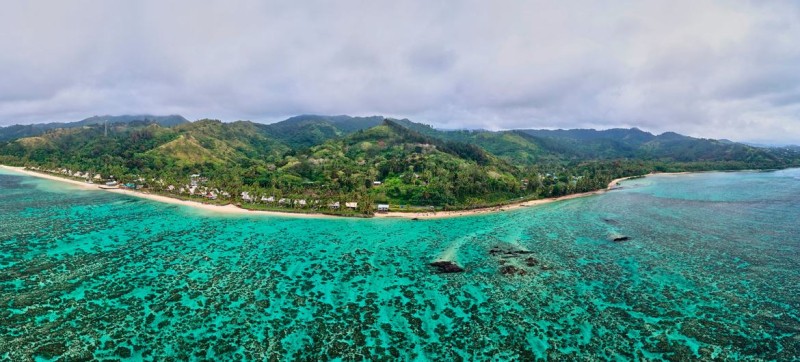
© Unsplash/Alec Douglas Viti Levu, in Fiji.
“The ocean is life. The ocean is livelihoods. The ocean binds humanity together across history and cultures”, said the Secretary-General, at a major General Assembly meeting marking the 40th anniversary of the adoption of the Convention.
He highlighted the breadth of the accord, spanning from “the air we breathe, to the atmosphere that sustains all life, to the ocean-based industries that employ some 40 million people, to the species that call the ocean home.”
Conservation, protection, sustainability
Among the key provisions of the Convention are the conservation of the world’s fisheries, marine protection, the right to resources within 200 nautical miles of national shorelines, and of increasing importance, the sustainable and equitable management of mineral-related activities in international waters.
“As we gather today, the Convention is more relevant than ever. The ocean is in dire straits”, the UN chief warned.
He said around 35 per cent of the world’s fisheries are simply being overexploited. Sea levels are rising as the climate crisis continues, and “the ocean is acidifying and choked with pollution.”
Dangers at sea
Coral reefs are bleaching, “epic floods” threaten coastal cities everywhere, and too often, “people working in ocean-based industries are not accessing the support or safe working conditions they need and deserve.”
Greater ambition is needed he told delegates, and the anniversary should be “an important reminder to continue using this critical instrument to tackle today’s challenges.”
He said the recently adopted Agreement on Fisheries Subsidies needed to be adopted swiftly, ensuring that all policies towards the ocean are “underpinned by the best science, and the best economic and social expertise.”
He said it meant bringing the wisdom and knowledge of Indigenous peoples and local communities into the Convention, ending what he called the plastic pollution crisis, and concluding next year the agreement on marine biological diversity of areas beyond national borders.
‘False dichotomy’
“It’s high time to end the false dichotomy between profit and protection of the ocean”, Mr. Guterres declared, adding that if we fail to protect it for future generations, “there can be no profit for anyone.”
He said governments should develop laws and policies that put protection and conservation first, while marine industries and investors, should make conservation, protection and climate resilience a top priority, along with worker safety.
“At every step, you can count on the United Nations to work with you to bring peace, stability and security to the ocean and its seas”, he told ambassadors. “Let’s safely deliver these incredible gifts into the waiting hands of the next generation.”
‘True UN success story’
The President of the General Assembly Csaba Kőrösi, reminded the anniversary meeting that the Convention was known by many as “the constitution of the oceans”.
“The fact that UNCLOS is just as relevant as ever is a true UN success story. This document can serve as an excellent example of what can be achieved when multilateralism is done right. What global governance can and should look like.”
He said “countless species and immense biodiversity” were facing extinction, amid rising sea temperatures. “And while the climate crisis threatens all humankind, in the context of the oceans, small islands are particularly vulnerable and face nothing short of an existential threat.”
He commended Portugal and Kenya for co-hosting the UN Ocean Conference in Lisbon this past summer, which addressed the major threats to the health, ecology, economy, and governance.
“I commend these efforts to mobilize action and seek major transformations.
We need science-based, innovative, and shared solutions, that involve green technology and inventive uses of marine resources.”

